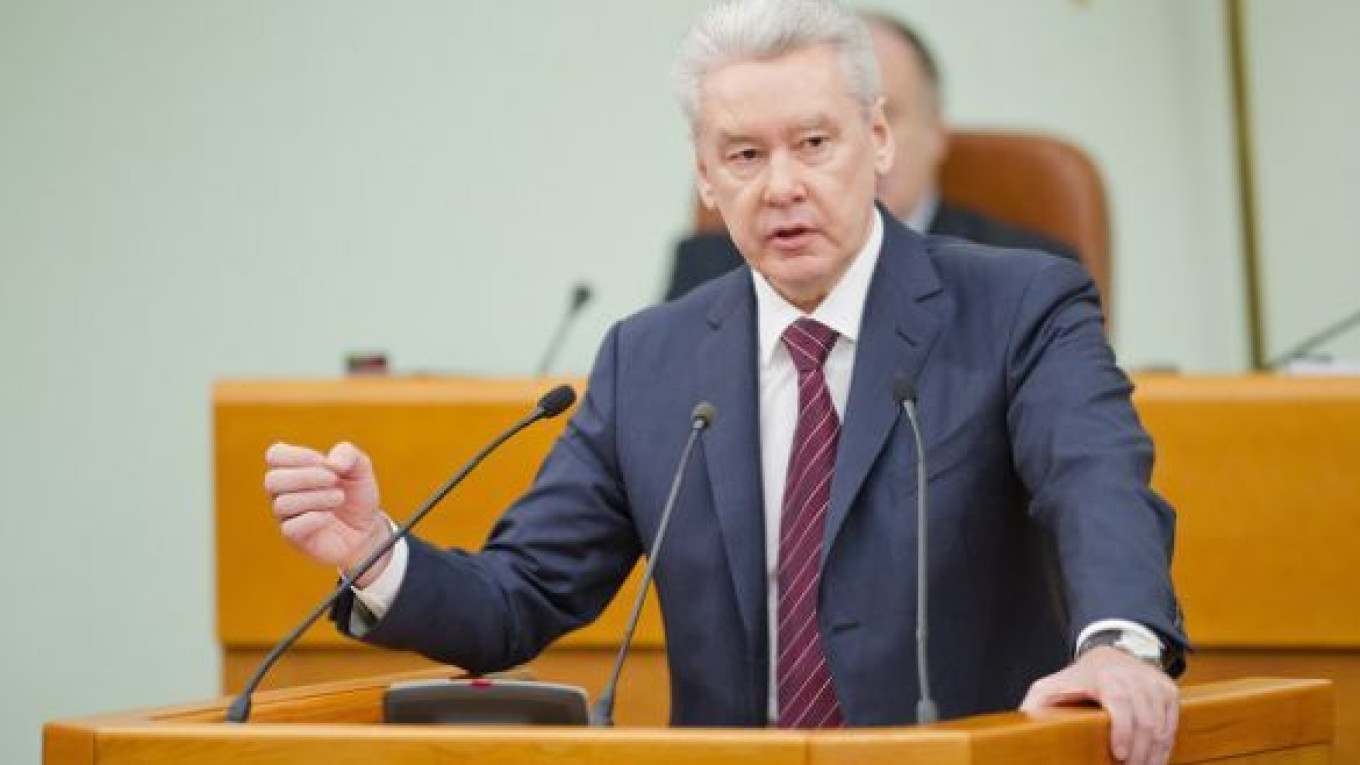Moscow's election committee announced Tuesday that debates for the Sept. 8 mayoral election will be held with the participation of all six candidates simultaneously — an arrangement many say is a result of acting Mayor Sergei Sobyanin's reluctance to go head to head with opposition leader Alexei Navalny.
While it remains unclear whether Sobyanin will take part in the debates, other candidates expressed outrage, saying the election committee's decision was made to pamper Sobyanin so that he could avoid any embarrassing moments.
They also ridiculed the explanation for the debate being televised with a broadcast delay, which Yury Zhiganov, a representative of Moskva Media holding, said was necessary because TV studios had no "technical capacity" to have a live broadcast.
"It's shameful nonsense," Leonid Volkov, the head of Navalny's campaign headquarters, said by telephone in reference to Zhiganov's comment, adding, however, that he considered the group debate "normal" in the given situation.
Twelve rounds of debates will run from Aug. 10 through Sep. 7 and be broadcast by two local TV channels, Moskva 24 and Doverie,? as well as two radio stations, Moskva FM and Govorit Moskva.
Ivan Melnikov, a candidate from the Communist Party, said Tuesday that the federal authorities should step in so that the debates would be broadcast live on federal TV channels, Interfax reported.
He said the current situation, with "debates to be held in an informational underground and likely without the acting mayor, demonstrates negligence not of [Sobyanin's] opponents, but of millions of Muscovites."
National media reported Tuesday that Sobyanin would probably not take part in the debates. His election office said it expected Navalny — who has criticized Sobyanin quite severely — to behave rudely with Sobyanin at the debates, and it did not want that to happen on air. The reports appeared before the election committee's decision was announced, however.
Pavel Salin, director of the Moscow Financial University's Center for Political Research, said a candidate refusing to take part in a political debate was nothing new.
"Sobyanin is implementing a model that was used during elections in the Moscow region town of Zhukovsky in March, when a candidate supported by official authorities, Andrei Voityuk, agreed only to a group debate, refusing a one-on-one debate with Civil Platform candidate Igor Novikov, who was his main rival," Salin said.
"As a result, the debate didn't influence Voityuk's poll numbers, but reduced those of Novikov and other candidates," he said, adding that the results of Moscow's mayoral debates would depend on how Navalny acts, though the debate would likely just showcase "a future mayor against amateur opposition politicians."
According to the election committee, each candidate will have 10 minutes at each debate session to express his opinion on a given issue. It is unclear whether candidates will be allowed to ask each other questions.
‘I think Sobyanin … has damaged himself in the eyes of Muscovites by refusing to participate.’
Sergei Mitrokhin
"I have many unpleasant questions for Sobyanin, but all the questions will likely be asked by a debate moderator," Yabloko candidate Sergei Mitrokhin said by telephone.
"The decision to hold a group debate was made to create the most comfortable atmosphere for Sobyanin, and I think Sobyanin has showed a lack of determination and damaged himself in the eyes of Muscovites by refusing to participate in honest debates," he said.
According to the Moscow Election Code, a candidate must personally participate in the debate and can not assign anyone else to represent him. If he chooses not to participate, he must provide notification two days prior to the debates.
"A candidate has the right to refuse to participate in the debates; the decision about Sobyanin's participation will depend on the election campaign," Andrei Paramonov, a representative of Sobyanin, told reporters Tuesday.
Salin said that despite Sobyanin's apparent eagerness to show that he did not stand apart from other candidates during the election campaign, his participation in the debates was unlikely.
But, he said, it all "depends on the dynamics of poll numbers, which are thoroughly monitored and analyzed by his campaign office."
Political debates — a genre that has little meaning in today's Russia — are usually ignored by top politicians. Neither former Moscow Mayor Yury Luzhkov nor President Vladimir Putin took part in the debates for their campaigns.
Contact the author at [email protected]
Related articles:
A Message from The Moscow Times:
Dear readers,
We are facing unprecedented challenges. Russia's Prosecutor General's Office has designated The Moscow Times as an "undesirable" organization, criminalizing our work and putting our staff at risk of prosecution. This follows our earlier unjust labeling as a "foreign agent."
These actions are direct attempts to silence independent journalism in Russia. The authorities claim our work "discredits the decisions of the Russian leadership." We see things differently: we strive to provide accurate, unbiased reporting on Russia.
We, the journalists of The Moscow Times, refuse to be silenced. But to continue our work, we need your help.
Your support, no matter how small, makes a world of difference. If you can, please support us monthly starting from just $2. It's quick to set up, and every contribution makes a significant impact.
By supporting The Moscow Times, you're defending open, independent journalism in the face of repression. Thank you for standing with us.
Remind me later.


